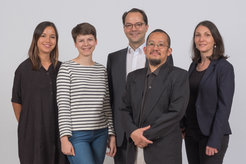Dominik Müller Receives Grant from the Daimler and Benz Foundation
Emmy Noether research group leader selected in competitive application process
Dr. Dominik Müller, head of the Emmy Noether Junior Research Group “The Bureaucratization of Islam and its Socio-Legal Dimensions in Southeast Asia” in the Department Law & Anthropology at the Max Planck Institute for Social Anthropology, has been awarded a grant from the Daimler and Benz Foundation following a multi-stage selection process. The funding covers 40,000 euros over a two-year period.

Anyone applying for a grant at the Daimler and Benz Foundation faces tough competition. In the most recent grant round there were 330 applicants, 40 of whom were invited to a two-day selection seminar. Of these 40 applicants, 12 were chosen to receive funding – a success rate of less than 4 per cent. Dominik Müller was one of the 12 successful applicants. We talked to him about the selection procedure and what he intends to do with the funding.
Dominik, what made you decide to apply for a grant from the Daimler and Benz Foundation?
The fellowship programme is aimed at young postdoctoral researchers from all disciplines, particularly junior professors and heads of junior research groups. It aims to strengthen the scientific autonomy and creativity of young scholars and supports their research by funding a two-year project. As the head of an Emmy Noether Junior Research Group, I found this appealing.
And then you applied immediately?
Well, first I looked into the Daimler and Benz Foundation and its charter and quickly became convinced that my work would fit in well with the programme.
What makes the grant programme particularly suited to your project?
Among other things, you can apply for funding for projects already underway. And this was ideal in my situation, because the close collaboration with our international cooperation partners during the first year and a half of the Emmy Noether project has generated new ideas and plans for activities that were not foreseen in the original project plan.
And the grant money will make all these new activities possible?
Yes, with the grant we can considerably expand the project and deepen the cooperation with our international partners. But besides the financial aspect, there are many other advantages to being a scholarship holder of the foundation.
What are these advantages?
One thing that makes the programme intriguing is the promotion of interdisciplinary exchange of ideas between the scholarship holders, who come from a wide variety of fields. This was already very evident during the selection seminar in Ladenburg. I think it’s great to talk to researchers from completely different disciplines whom I would otherwise not ordinarily come in to contact with. I am therefore very much looking forward to the gatherings hosted by the foundation.
What is the topic of the project for which you received funding?
The project is called “Social Categorization and Religiously Framed State-Making in Southeast Asia”. It will expand on a part of my Emmy Noether project that investigates the social categorization practices of religious bureaucratic actors and what effects these practices have in the region. In addition, I want to broaden the project to include other (state) religions in Southeast Asia as part of the collaboration with my research partners. This enables us to produce a comparative framework that would have been beyond the scope of the original project.
And what will the additional funds allow you to accomplish?
I plan to use the grant to finance three workshops. First, a two-day workshop in June 2018 at the Asian Studies Centre at the University of Oxford, with which my group works closely together. The workshop was not budgeted for in the Emmy Noether project plan, and in fact the idea only emerged in the course of working with our colleagues in Oxford. The event will address the main topic of the grant, i.e. social categorization and religious bureaucracies. My doctoral students will travel from their fieldwork sites in Southeast Asia to England for a week. We will use this week after the workshop to intensively discuss data collection and further project development in the group. The workshop will also be the basis for a publication that I hope to publish together with Matthew Walton, the director of the Asian Studies Centre. In addition to studies of Islam, the publication will include examples from Buddhist contexts – the subject of current work by Matthew Walton and several of his team members in Myanmar and Thailand. A contribution looking at Christianity in the Philippines would also be desirable. In April 2019, a follow-up workshop will take place in Harvard to further deepen the debate, especially with regard to the dynamics of social categorization in the context of legal and social transformation processes. It is funded by the initiative “Law and Social Change” of Harvard’s Islamic Legal Studies Program, where I am currently a Fellow.
And the third workshop?
The third event, which we are calling a "mini-workshop", will take place in September 2018 at the Centre for Asian Legal Studies of the National University of Singapore, our second project partner. The focus will be on my three doctoral students and their individual projects in Indonesia, Malaysia and the Philippines. At that point they will be in the final phase of their one-year fieldwork and will only be in Southeast Asia for just under two months after that. At this stage, when they need to start organizing the collected data and thinking about writing, important decisions need to be made about how to use the remaining time on site.
Three additional workshops is an ambitious goal.
Well, yes – however, the grant should enable me to hire an additional student assistant, which makes a lot of things easier. In addition, the grant will enormously enrich the work of my group and, of course, my personal research and career development beyond the Emmy Noether Project.
